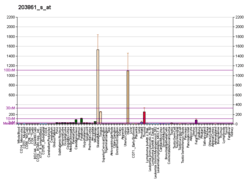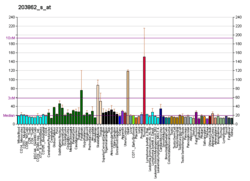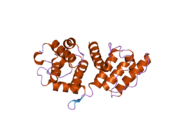Actinin alpha 2
Alpha-actinin 2 is a protein which in humans is encoded by the ACTN2 gene.[3] This gene encodes an alpha-actinin isoform that is expressed in both skeletal and cardiac muscles and functions to anchor myofibrillar actin thin filaments and titin to Z-discs.
Structure
Alpha-actinin 2 is a 103.8 kDa protein composed of 894 amino acids.[4][5] Each molecule is rod-shaped (35 nm in length) and it homodimerizes in an anti-parallel fashion. Each monomer has an N-terminal actin-binding region composed of two calponin homology domains, two C-terminal EF hand domains, and four tandem spectrin-like repeats form the rod domain in the central region of the molecule.[6] The high-resolution crystal structure of human alpha-actinin 2 at 3.5 Å was recently resolved.[7] Alpha actinins belong to the spectrin gene superfamily which represents a diverse group of actin-binding cytoskeletal proteins, including spectrin, dystrophin, utrophin and fimbrin.[6] Skeletal, cardiac, and smooth muscle isoforms are localized to the Z-disc and analogous dense bodies, where they help anchor the myofibrillar actin filaments. Alpha-actinin 2 has been shown to interact with KCNA5,[8][9] DLG1,[8] DISC1,[10] MYOZ1,[11] GRIN2B,[12] ADAM12,[13] ACTN3,[14] MYPN,[15] PDLIM3,[16] PKN,[17] MYOT,[18] TTN,[19] NMDAR,[20] SYNPO2,[21] LDB3,[22] and FATZ.[11]
Function
The primary function of alpha-actinin 2 is to crosslink filamentous actin molecules and titin molecules from adjoining sarcomeres at Z-discs, a function that is modulated by phospholipids.[23][24] It is clear from studies by Hampton et al. that this crosslinking can assume a variety of conformations, with preferences for 60° and 120° angles.[25] Alpha-actinin 2 also functions in docking signalling molecules at Z-discs, and additional studies have also implicated alpha-actinin 2 in the binding of cardiac ion channels, Kv1.5 in particular.[8]
Clinical significance
Mutations in ACTN2 are associated with hypertrophic cardiomyopathy,[26] as well as dilated cardiomyopathy and endocardial fibroelastosis.[27] The diverse functions of alpha-actinin 2 are reflected in the diverse clinical presentation of patients carrying ACTN2 mutations.[28]
References
- ↑ "Human PubMed Reference:".
- ↑ "Mouse PubMed Reference:".
- ↑ "Entrez Gene: ACTN2 actinin, alpha 2".
- ↑ "Protein Information – Basic Information: Protein COPaKB ID: P35609". Cardiac Organellar Protein Atlas Knowledgebase.
- ↑ Zong NC, Li H, Li H, Lam MP, Jimenez RC, Kim CS, Deng N, Kim AK, Choi JH, Zelaya I, Liem D, Meyer D, Odeberg J, Fang C, Lu HJ, Xu T, Weiss J, Duan H, Uhlen M, Yates JR, Apweiler R, Ge J, Hermjakob H, Ping P (October 2013). "Integration of cardiac proteome biology and medicine by a specialized knowledgebase". Circulation Research. 113 (9): 1043–53. PMC 4076475
 . PMID 23965338. doi:10.1161/CIRCRESAHA.113.301151.
. PMID 23965338. doi:10.1161/CIRCRESAHA.113.301151. - 1 2 Luther PK (2009). "The vertebrate muscle Z-disc: sarcomere anchor for structure and signalling". Journal of Muscle Research and Cell Motility. 30 (5–6): 171–85. PMC 2799012
 . PMID 19830582. doi:10.1007/s10974-009-9189-6.
. PMID 19830582. doi:10.1007/s10974-009-9189-6. - ↑ Ribeiro Ede A, Pinotsis N, Ghisleni A, Salmazo A, Konarev PV, Kostan J, Sjöblom B, Schreiner C, Polyansky AA, Gkougkoulia EA, Holt MR, Aachmann FL, Zagrović B, Bordignon E, Pirker KF, Svergun DI, Gautel M, Djinović-Carugo K (December 2014). "The structure and regulation of human muscle α-actinin". Cell. 159 (6): 1447–60. PMC 4259493
 . PMID 25433700. doi:10.1016/j.cell.2014.10.056.
. PMID 25433700. doi:10.1016/j.cell.2014.10.056. - 1 2 3 Eldstrom J, Choi WS, Steele DF, Fedida D (July 2003). "SAP97 increases Kv1.5 currents through an indirect N-terminal mechanism". FEBS Letters. 547 (1–3): 205–11. PMID 12860415. doi:10.1016/S0014-5793(03)00668-9.
- ↑ Maruoka ND, Steele DF, Au BP, Dan P, Zhang X, Moore ED, Fedida D (May 2000). "alpha-actinin-2 couples to cardiac Kv1.5 channels, regulating current density and channel localization in HEK cells". FEBS Letters. 473 (2): 188–94. PMID 10812072. doi:10.1016/S0014-5793(00)01521-0.
- ↑ Morris JA, Kandpal G, Ma L, Austin CP (July 2003). "DISC1 (Disrupted-In-Schizophrenia 1) is a centrosome-associated protein that interacts with MAP1A, MIPT3, ATF4/5 and NUDEL: regulation and loss of interaction with mutation". Human Molecular Genetics. 12 (13): 1591–608. PMID 12812986. doi:10.1093/hmg/ddg162.
- 1 2 Faulkner G, Pallavicini A, Comelli A, Salamon M, Bortoletto G, Ievolella C, Trevisan S, Kojic' S, Dalla Vecchia F, Laveder P, Valle G, Lanfranchi G (December 2000). "FATZ, a filamin-, actinin-, and telethonin-binding protein of the Z-disc of skeletal muscle". The Journal of Biological Chemistry. 275 (52): 41234–42. PMID 10984498. doi:10.1074/jbc.M007493200.
- ↑ Wyszynski M, Lin J, Rao A, Nigh E, Beggs AH, Craig AM, Sheng M (January 1997). "Competitive binding of alpha-actinin and calmodulin to the NMDA receptor". Nature. 385 (6615): 439–42. PMID 9009191. doi:10.1038/385439a0.
- ↑ Galliano MF, Huet C, Frygelius J, Polgren A, Wewer UM, Engvall E (May 2000). "Binding of ADAM12, a marker of skeletal muscle regeneration, to the muscle-specific actin-binding protein, alpha -actinin-2, is required for myoblast fusion". The Journal of Biological Chemistry. 275 (18): 13933–9. PMID 10788519. doi:10.1074/jbc.275.18.13933.
- ↑ Chan Y, Tong HQ, Beggs AH, Kunkel LM (July 1998). "Human skeletal muscle-specific alpha-actinin-2 and -3 isoforms form homodimers and heterodimers in vitro and in vivo". Biochemical and Biophysical Research Communications. 248 (1): 134–9. PMID 9675099. doi:10.1006/bbrc.1998.8920.
- ↑ Bang ML, Mudry RE, McElhinny AS, Trombitás K, Geach AJ, Yamasaki R, Sorimachi H, Granzier H, Gregorio CC, Labeit S (April 2001). "Myopalladin, a novel 145-kilodalton sarcomeric protein with multiple roles in Z-disc and I-band protein assemblies". The Journal of Cell Biology. 153 (2): 413–27. PMC 2169455
 . PMID 11309420. doi:10.1083/jcb.153.2.413.
. PMID 11309420. doi:10.1083/jcb.153.2.413. - ↑ Pomiès P, Macalma T, Beckerle MC (October 1999). "Purification and characterization of an alpha-actinin-binding PDZ-LIM protein that is up-regulated during muscle differentiation". The Journal of Biological Chemistry. 274 (41): 29242–50. PMID 10506181. doi:10.1074/jbc.274.41.29242.
- ↑ Mukai H, Toshimori M, Shibata H, Takanaga H, Kitagawa M, Miyahara M, Shimakawa M, Ono Y (February 1997). "Interaction of PKN with alpha-actinin". The Journal of Biological Chemistry. 272 (8): 4740–6. PMID 9030526. doi:10.1074/jbc.272.8.4740.
- ↑ Salmikangas P, Mykkänen OM, Grönholm M, Heiska L, Kere J, Carpén O (July 1999). "Myotilin, a novel sarcomeric protein with two Ig-like domains, is encoded by a candidate gene for limb-girdle muscular dystrophy". Human Molecular Genetics. 8 (7): 1329–36. PMID 10369880. doi:10.1093/hmg/8.7.1329.
- ↑ Young P, Ferguson C, Bañuelos S, Gautel M (March 1998). "Molecular structure of the sarcomeric Z-disk: two types of titin interactions lead to an asymmetrical sorting of alpha-actinin". The EMBO Journal. 17 (6): 1614–24. PMC 1170509
 . PMID 9501083. doi:10.1093/emboj/17.6.1614.
. PMID 9501083. doi:10.1093/emboj/17.6.1614. - ↑ Chunn CJ, Starr PR, Gilbert DN (August 1977). "Neutrophil toxicity of amphotericin B". Antimicrobial Agents and Chemotherapy. 12 (2): 226–30. PMC 429889
 . PMID 900919. doi:10.1128/aac.12.2.226.
. PMID 900919. doi:10.1128/aac.12.2.226. - ↑ Linnemann A, van der Ven PF, Vakeel P, Albinus B, Simonis D, Bendas G, Schenk JA, Micheel B, Kley RA, Fürst DO (September 2010). "The sarcomeric Z-disc component myopodin is a multiadapter protein that interacts with filamin and alpha-actinin". European Journal of Cell Biology. 89 (9): 681–92. PMID 20554076. doi:10.1016/j.ejcb.2010.04.004.
- ↑ Jani K, Schöck F (December 2007). "Zasp is required for the assembly of functional integrin adhesion sites". The Journal of Cell Biology. 179 (7): 1583–97. PMC 2373490
 . PMID 18166658. doi:10.1083/jcb.200707045.
. PMID 18166658. doi:10.1083/jcb.200707045. - ↑ Young P, Gautel M (December 2000). "The interaction of titin and alpha-actinin is controlled by a phospholipid-regulated intramolecular pseudoligand mechanism". The EMBO Journal. 19 (23): 6331–40. PMC 305858
 . PMID 11101506. doi:10.1093/emboj/19.23.6331.
. PMID 11101506. doi:10.1093/emboj/19.23.6331. - ↑ Fukami K, Furuhashi K, Inagaki M, Endo T, Hatano S, Takenawa T (September 1992). "Requirement of phosphatidylinositol 4,5-bisphosphate for alpha-actinin function". Nature. 359 (6391): 150–2. PMID 1326084. doi:10.1038/359150a0.
- ↑ Hampton CM, Taylor DW, Taylor KA (April 2007). "Novel structures for alpha-actinin:F-actin interactions and their implications for actin-membrane attachment and tension sensing in the cytoskeleton". Journal of Molecular Biology. 368 (1): 92–104. PMC 1919418
 . PMID 17331538. doi:10.1016/j.jmb.2007.01.071.
. PMID 17331538. doi:10.1016/j.jmb.2007.01.071. - ↑ Chiu C, Bagnall RD, Ingles J, Yeates L, Kennerson M, Donald JA, Jormakka M, Lind JM, Semsarian C (March 2010). "Mutations in alpha-actinin-2 cause hypertrophic cardiomyopathy: a genome-wide analysis". Journal of the American College of Cardiology. 55 (11): 1127–35. PMID 20022194. doi:10.1016/j.jacc.2009.11.016.
- ↑ Mohapatra B, Jimenez S, Lin JH, Bowles KR, Coveler KJ, Marx JG, Chrisco MA, Murphy RT, Lurie PR, Schwartz RJ, Elliott PM, Vatta M, McKenna W, Towbin JA, Bowles NE (2003). "Mutations in the muscle LIM protein and alpha-actinin-2 genes in dilated cardiomyopathy and endocardial fibroelastosis". Molecular Genetics and Metabolism. 80 (1–2): 207–15. PMID 14567970. doi:10.1016/s1096-7192(03)00142-2.
- ↑ Bagnall RD, Molloy LK, Kalman JM, Semsarian C (September 2014). "Exome sequencing identifies a mutation in the ACTN2 gene in a family with idiopathic ventricular fibrillation, left ventricular noncompaction, and sudden death". BMC Medical Genetics. 15 (1): 99. PMC 4355500
 . PMID 25224718. doi:10.1186/s12881-014-0099-0.
. PMID 25224718. doi:10.1186/s12881-014-0099-0.
Further reading
- Faulkner G, Lanfranchi G, Valle G (May 2001). "Telethonin and other new proteins of the Z-disc of skeletal muscle". IUBMB Life. 51 (5): 275–82. PMID 11699871. doi:10.1080/152165401317190761.
- Beggs AH, Byers TJ, Knoll JH, Boyce FM, Bruns GA, Kunkel LM (May 1992). "Cloning and characterization of two human skeletal muscle alpha-actinin genes located on chromosomes 1 and 11". The Journal of Biological Chemistry. 267 (13): 9281–8. PMID 1339456.
- Beggs AH, Phillips HA, Kozman H, Mulley JC, Wilton SD, Kunkel LM, Laing NG (August 1992). "A (CA)n repeat polymorphism for the human skeletal muscle alpha-actinin gene ACTN2 and its localization on the linkage map of chromosome 1". Genomics. 13 (4): 1314–5. PMID 1505962. doi:10.1016/0888-7543(92)90054-V.
- Yürüker B, Niggli V (February 1992). "Alpha-actinin and vinculin in human neutrophils: reorganization during adhesion and relation to the actin network". Journal of Cell Science. 101 (2): 403–14. PMID 1629252.
- Pavalko FM, LaRoche SM (October 1993). "Activation of human neutrophils induces an interaction between the integrin beta 2-subunit (CD18) and the actin binding protein alpha-actinin". Journal of Immunology. 151 (7): 3795–807. PMID 8104223.
- Yoshida M, Westlin WF, Wang N, Ingber DE, Rosenzweig A, Resnick N, Gimbrone MA (April 1996). "Leukocyte adhesion to vascular endothelium induces E-selectin linkage to the actin cytoskeleton". The Journal of Cell Biology. 133 (2): 445–55. PMC 2120789
 . PMID 8609175. doi:10.1083/jcb.133.2.445.
. PMID 8609175. doi:10.1083/jcb.133.2.445. - Wyszynski M, Lin J, Rao A, Nigh E, Beggs AH, Craig AM, Sheng M (January 1997). "Competitive binding of alpha-actinin and calmodulin to the NMDA receptor". Nature. 385 (6615): 439–42. PMID 9009191. doi:10.1038/385439a0.
- Mukai H, Toshimori M, Shibata H, Takanaga H, Kitagawa M, Miyahara M, Shimakawa M, Ono Y (February 1997). "Interaction of PKN with alpha-actinin". The Journal of Biological Chemistry. 272 (8): 4740–6. PMID 9030526. doi:10.1074/jbc.272.8.4740.
- Young P, Ferguson C, Bañuelos S, Gautel M (March 1998). "Molecular structure of the sarcomeric Z-disk: two types of titin interactions lead to an asymmetrical sorting of alpha-actinin". The EMBO Journal. 17 (6): 1614–24. PMC 1170509
 . PMID 9501083. doi:10.1093/emboj/17.6.1614.
. PMID 9501083. doi:10.1093/emboj/17.6.1614. - Zhang S, Ehlers MD, Bernhardt JP, Su CT, Huganir RL (August 1998). "Calmodulin mediates calcium-dependent inactivation of N-methyl-D-aspartate receptors". Neuron. 21 (2): 443–53. PMID 9728925. doi:10.1016/S0896-6273(00)80553-X.
- Krupp JJ, Vissel B, Thomas CG, Heinemann SF, Westbrook GL (February 1999). "Interactions of calmodulin and alpha-actinin with the NR1 subunit modulate Ca2+-dependent inactivation of NMDA receptors". The Journal of Neuroscience. 19 (4): 1165–78. PMID 9952395.
- Zhou Q, Ruiz-Lozano P, Martone ME, Chen J (July 1999). "Cypher, a striated muscle-restricted PDZ and LIM domain-containing protein, binds to alpha-actinin-2 and protein kinase C". The Journal of Biological Chemistry. 274 (28): 19807–13. PMID 10391924. doi:10.1074/jbc.274.28.19807.
- Faulkner G, Pallavicini A, Formentin E, Comelli A, Ievolella C, Trevisan S, Bortoletto G, Scannapieco P, Salamon M, Mouly V, Valle G, Lanfranchi G (July 1999). "ZASP: a new Z-band alternatively spliced PDZ-motif protein". The Journal of Cell Biology. 146 (2): 465–75. PMC 3206570
 . PMID 10427098. doi:10.1083/jcb.146.2.465.
. PMID 10427098. doi:10.1083/jcb.146.2.465. - Tiso N, Majetti M, Stanchi F, Rampazzo A, Zimbello R, Nava A, Danieli GA (November 1999). "Fine mapping and genomic structure of ACTN2, the human gene coding for the sarcomeric isoform of alpha-actinin-2, expressed in skeletal and cardiac muscle". Biochemical and Biophysical Research Communications. 265 (1): 256–9. PMID 10548523. doi:10.1006/bbrc.1999.1661.
- Nikolopoulos SN, Spengler BA, Kisselbach K, Evans AE, Biedler JL, Ross RA (January 2000). "The human non-muscle alpha-actinin protein encoded by the ACTN4 gene suppresses tumorigenicity of human neuroblastoma cells". Oncogene. 19 (3): 380–6. PMID 10656685. doi:10.1038/sj.onc.1203310.
- Galliano MF, Huet C, Frygelius J, Polgren A, Wewer UM, Engvall E (May 2000). "Binding of ADAM12, a marker of skeletal muscle regeneration, to the muscle-specific actin-binding protein, alpha -actinin-2, is required for myoblast fusion". The Journal of Biological Chemistry. 275 (18): 13933–9. PMID 10788519. doi:10.1074/jbc.275.18.13933.
- Maruoka ND, Steele DF, Au BP, Dan P, Zhang X, Moore ED, Fedida D (May 2000). "alpha-actinin-2 couples to cardiac Kv1.5 channels, regulating current density and channel localization in HEK cells". FEBS Letters. 473 (2): 188–94. PMID 10812072. doi:10.1016/S0014-5793(00)01521-0.
- Kotaka M, Kostin S, Ngai S, Chan K, Lau Y, Lee SM, Li H, Ng EK, Schaper J, Tsui SK, Fung K, Lee C, Waye MM (June 2000). "Interaction of hCLIM1, an enigma family protein, with alpha-actinin 2". Journal of Cellular Biochemistry. 78 (4): 558–65. PMID 10861853. doi:10.1002/1097-4644(20000915)78:4<558::AID-JCB5>3.0.CO;2-I.
- Parast MM, Otey CA (August 2000). "Characterization of palladin, a novel protein localized to stress fibers and cell adhesions". The Journal of Cell Biology. 150 (3): 643–56. PMC 2175193
 . PMID 10931874. doi:10.1083/jcb.150.3.643.
. PMID 10931874. doi:10.1083/jcb.150.3.643. - Faulkner G, Pallavicini A, Comelli A, Salamon M, Bortoletto G, Ievolella C, Trevisan S, Kojic' S, Dalla Vecchia F, Laveder P, Valle G, Lanfranchi G (December 2000). "FATZ, a filamin-, actinin-, and telethonin-binding protein of the Z-disc of skeletal muscle". The Journal of Biological Chemistry. 275 (52): 41234–42. PMID 10984498. doi:10.1074/jbc.M007493200.
External links
- Mass spectrometry characterization of human ACTN2 at COPaKB
- GeneReviews/NIH/NCBI/UW entry on Familial Hypertrophic Cardiomyopathy Overview
- Human ACTN2 genome location and ACTN2 gene details page in the UCSC Genome Browser.








